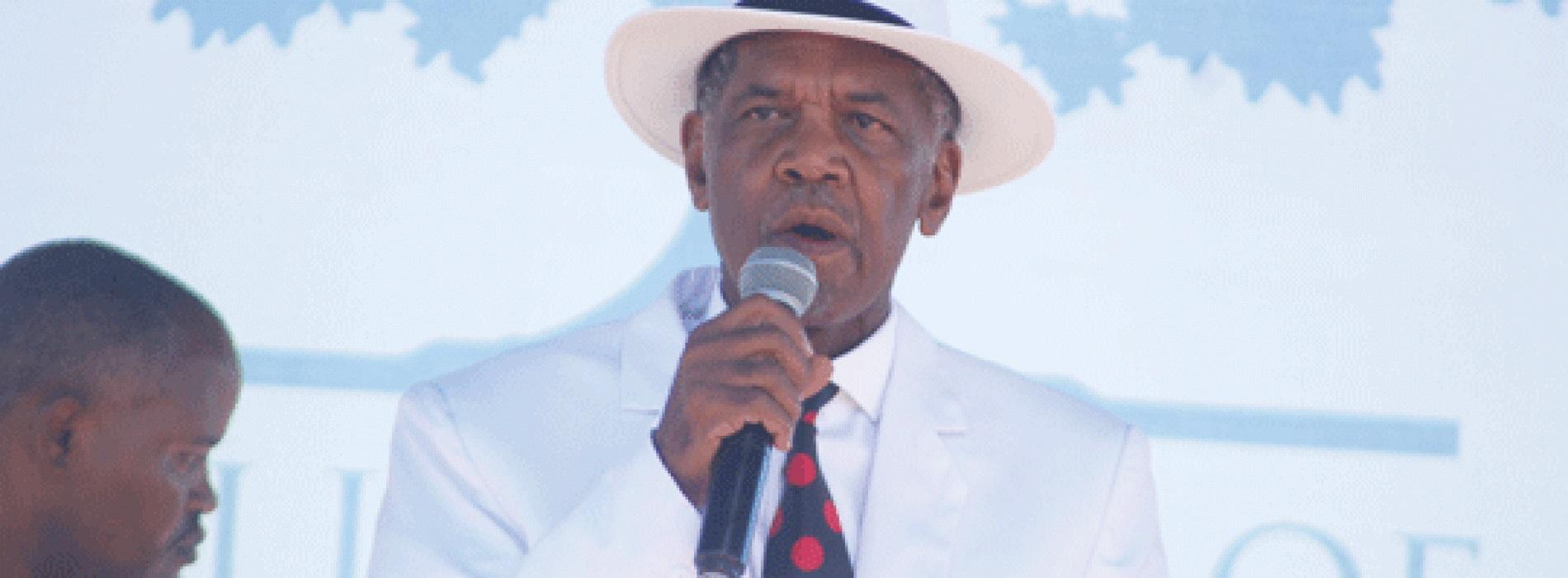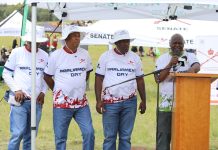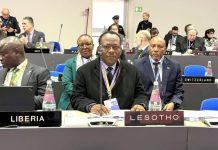Africa-Press – Lesotho. To hear the leader of the Alliance of Democrats (AD) Monyane Moleleki announce that he intends to make way for a younger leader in his constituency of Machache is refreshing because such pronouncements by politicians in Lesotho are rare.
It’s also refreshing because it reveals an important trait of leadership we don’t often see in our leaders, i. e. humility. So unexpected was this announcement that even the old man of South African politics Chief Mangosuthu Buthelezi was encouraged to himself announce that he would no longer stand as party leader at the next IFP elective conference.
He would make way for a younger leader. I can actually imagine the Chief on hearing the news saying “Madoda a kithi, I want to follow the example set by my brother in Lesotho.
I too will make way for younger blood. It’s better late than never. Life outside politics doesn’t appear as bad as I thought. Look at Lehohla, Nujoma, Mbeki, Mogae, Chissano, Guebuza, Mkapa, Kikwete, Rawlings, Kufour, Mahama, Obasanjo, Banda etc.
More respected now than when they were in active politics. ”
Full marks for Ntate Moleleki for doing something that has presented us very positively on the world stage.
This is welcome relief from the usual nonsense of always being in the news for the wrong reasons. Imagine how much more powerful Lesotho would appear to the world if more of Ntate Moleleki’s age mates (65 years and above) would follow his example.
By remaining stubbornly immersed in our politics, these “timers” cause us more damage than good. They prevent us opening Lesotho up to new possibilities.
Their continued presence is stifling much needed innovation. This is because their ancient ways block the emergence of new ideas we need for growth and development.
Any good they may be contributing now pales in comparison to what is possible from a much younger body and mind in the same position. Their time is up. They need to retire. Let me cut to the chase — Lesotho has a paucity of good leadership. It’s a fact.
Our leaders both past and present, except for the founder of this nation, have failed and continue to fail to impress on seven defining leadership traits — vision, courage, integrity, humility, strategic thinking, focus and cooperation.
Good leaders have vision. This means that they can see into the future and are able to articulate this future in a way that motivates us to want to get there.
Our leaders have no such ability. It’s therefore no accident that Vision 2020 has been a dismal failure. Good leaders have courage i. e. they face difficulties and danger with bravery.
We have many challenges in this country e. g. slow economic growth, high youth unemployment, pervasive corruption, high HIV prevalence, high child mortality etc.
Our leaders have demonstrated lack of courage when dealing with these challenges. Take for example how successive governments have preferred cadre deployment to competence and merit when making appointments to state positions.
It’s easier to appease party loyalists than to do the right thing. Over the years, this has had the effect of weakening the state and thus worsening our already dire situation.
This is not good leadership. Good leaders always tell the truth i. e. they have integrity. Telling us a lie with a straight face that SADC recommendations are not binding is but one small example of how shameless some of our leaders have become (i.
e. unable to differentiate the truth from lies). Integrity is one quality most politicians in Lesotho do not have. Great leaders show humility i. e. the ability to accept that they do not have all the answers. This is where Ntate Moleleki has shown himself to be exceptional.
His decision when it eventually translates to reality (remember we need to take what politicians says in Lesotho with a pinch of salt), will prove that perhaps he is not driven by ego to the same extent as our other politicians.
He realises that for Machache to get to the next level, it will require someone else to take it there. He has done his bit. This is the sort of stuff that defines great leadership i.
e. the awareness that “others” are valuable and have value to give as well. Most of our leaders have no humility. Most of them falsely think they know it all and only they possess the answers to our problems.
This attitude is what has caused the entrenched sycophancy and mediocracy found in the high echelons of all political parties in Lesotho. Notice too how as senility sets in, the “timers” start to believe the old lie that things will fall apart were they to depart.
This nonsense is often whispered in their ear by the sycophants who surround them. Being a strategic thinker is another trait of great leadership. This is the ability to anticipate trends well in advance of everyone else.
A leader is yet to emerge from amongst us who possesses this quality. But in the meantime, let’s be content to celebrate the likes of Nyerere, Sankara, Selassie, Lumumba, Nkrumah, Kaunda, Machel, Kenyatta, and Mandela.
Hopefully, this will encourage us to set a higher yardstick for leadership in Lesotho and to avoid celebrating, lauding and making heroes of leaders from our past who presided over terrible human rights abuses.
Our heroes must be impeccable. Great leaders also know where to direct their focus. Great leaders focus on the needs and aspirations of the people they lead and not on their own needs.
With corruption out of control and seemingly normalised and no visible headway being made to eradicate it, it’s clear our leaders do not know where to direct their focus i.
e. towards national interest and away from self-interest. Cooperation i. e. the ability to get everyone to work and pull together is the seventh defining leadership characteristic.
To see how our politicians are not good at cooperation, consider the number of times political parties in this country splinter. Consider too, how two coalition governments failed due to a power struggle between politicians who couldn’t understand that country comes before self.
This is the backup I submit for alleging that Lesotho has and has always had a paucity of good leadership. For this to change, our younger leaders should recognise that to be considered great African Leaders, they must surpass the efforts of our past and current leaders by at least ten-fold.
What I omitted to mention right at the onset is that Ntate Moleleki’s decision even though refreshing, it remains insignificant. This insignificance is underlined by the fact that he must still walk the talk.
We should not therefore, suddenly make Ntate Moleleki the epitome of good leadership. Because if we do that, we continue to be peddlers of mediocre leadership.






